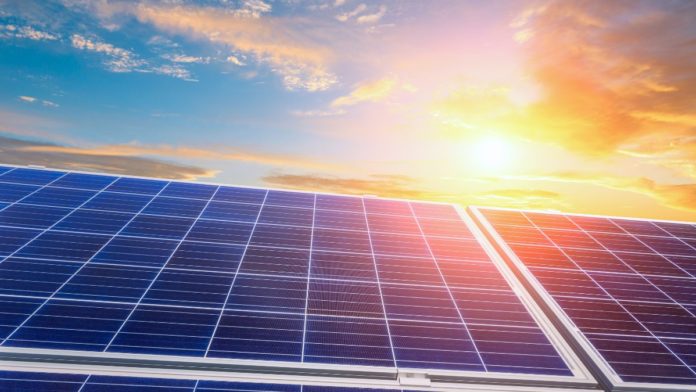
Sailing the open seas is a dream for many, offering freedom, tranquility, and a close connection with nature. However, the energy needs of a yacht can pose challenges for sustainability-minded mariners. Traditional energy sources, like diesel generators, are reliable but come with environmental costs and noise pollution.
In recent years, solar panels have emerged as a popular solution for powering yachts, aligning with the growing trend toward eco-friendly boating. By harnessing the sun’s abundant energy, yacht owners can reduce their environmental footprint while gaining greater energy autonomy. But are solar panels the right choice for your vessel?
This article explores the pros and cons of installing solar panels on yachts, helping you weigh the benefits and challenges.
Pros of Installing Solar Panels on Yachts

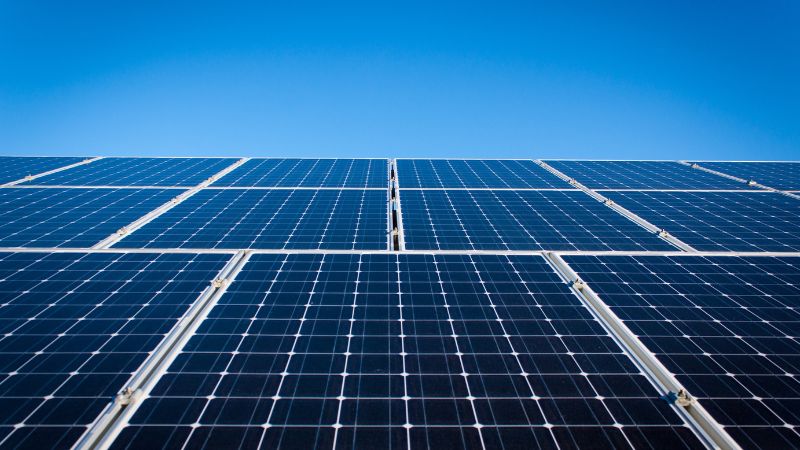
Energy Efficiency and Autonomy
Solar panels on yachts offer an efficient and autonomous way to generate energy, enabling sailors to harness solar power instead of relying heavily on traditional fuel-powered generators. With their ability to convert sunlight into electricity, solar panels ensure a consistent energy supply for various onboard systems like navigation, lighting, and refrigeration. For cruisers or liveaboards, this translates to enhanced operational independence, particularly during extended trips or when anchored in remote areas. By reducing dependency on shore power or diesel, yachts can operate with greater freedom and flexibility
Eco-Friendly Power Source
Solar panels represent a clean and sustainable power solution. Unlike diesel engines or generators, which emit greenhouse gases and contribute to noise pollution, solar panels operate silently and produce zero emissions. This makes them an ideal choice for eco-conscious sailors aiming to minimize their environmental impact. By opting for solar energy, yacht owners contribute to global efforts toward sustainability while preserving the tranquility of marine environments. Moreover, combining solar panels with other renewable energy systems, such as wind turbines or hydrogeneration, can create a completely green energy cycle onboard.
Cost Savings Over Time
Although the initial investment in solar panels can be substantial, the long-term cost benefits are significant. Solar panels reduce or eliminate the need to purchase fuel for generators, lowering operating costs over time. The cost savings become especially noticeable during extended cruises, where energy demands are high. High-quality solar panels often have a lifespan exceeding 20 years, making them a durable investment with a favorable return. Modern innovations, like flexible and lightweight panels, have also reduced installation costs, further enhancing affordability.
Quiet and Low Maintenance Energy
One of the most appealing features of solar panels is their quiet operation and minimal maintenance requirements. Unlike fuel-powered generators, which can be noisy and disruptive, solar panels work silently, ensuring a more peaceful onboard environment. Maintenance typically involves cleaning the panels to remove salt or debris and occasionally checking connections, making them a hassle-free addition to the yacht’s energy system. With no moving parts, the likelihood of mechanical failures is low, contributing to their reliability and durability over years of use.
Read also: Does Starlink Work at Sea on a Yacht? A Complete Guide to Starlink Internet for Boating
Cons of Using Solar Panels on Yachts

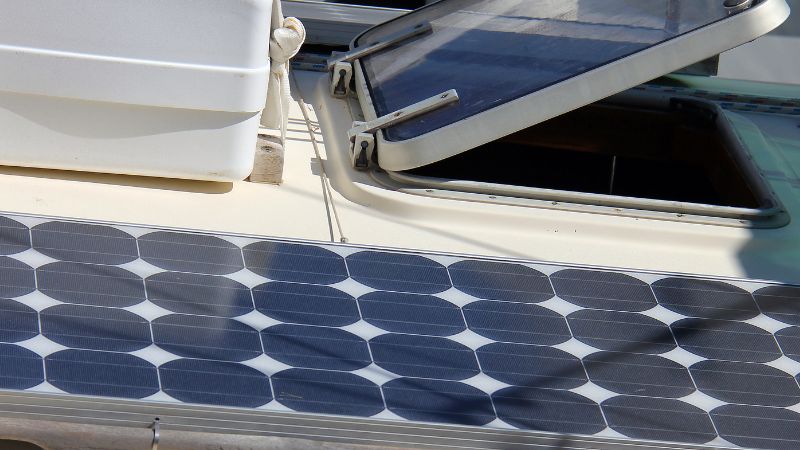
Initial Installation Costs
The upfront cost of installing solar panels on yachts can be significant. Expenses include purchasing high-quality marine-grade solar panels, charge controllers, and battery storage systems, along with the professional labor required for installation. Additional components like custom mounts or wiring for marine conditions further increase costs. While DIY options exist, they may not meet marine safety standards, making professional installation a more reliable but costly option. These costs can deter initial adoption despite the long-term savings they offer
Dependence on Weather Conditions
Solar panels depend heavily on sunlight for optimal performance, making their efficiency weather-dependent. While they can still generate power on cloudy days or in indirect light, their output is significantly reduced, often to 10–60% of their capacity. Prolonged overcast conditions or heavy shading from nearby structures can hamper their reliability. This variability necessitates supplemental power systems for yachts relying heavily on solar energy
Limited Power Output for High Energy Demands
Although solar panels are excellent for powering low-energy devices like lights or navigation systems, their output may not meet the demands of high-energy appliances such as air conditioning or water heaters. Even large arrays may struggle to consistently provide enough power for these energy-intensive needs, especially during periods of reduced sunlight. For yachts requiring high power levels, solar panels often act as supplementary sources rather than primary power providers
These points highlight the benefits and constraints of using solar panels on yachts, providing valuable considerations for prospective users. Let me know if you’d like more details or additional points expanded!
Read also: Yacht Buyer’s Guide: Top 10 Mistakes to Avoid for First-Time Buyers
Factors to Consider Before Installing Solar Panels
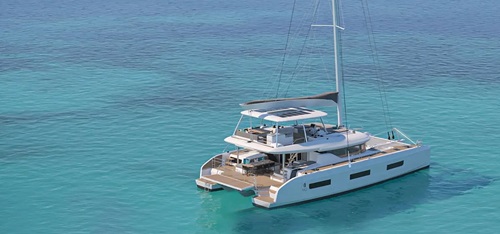
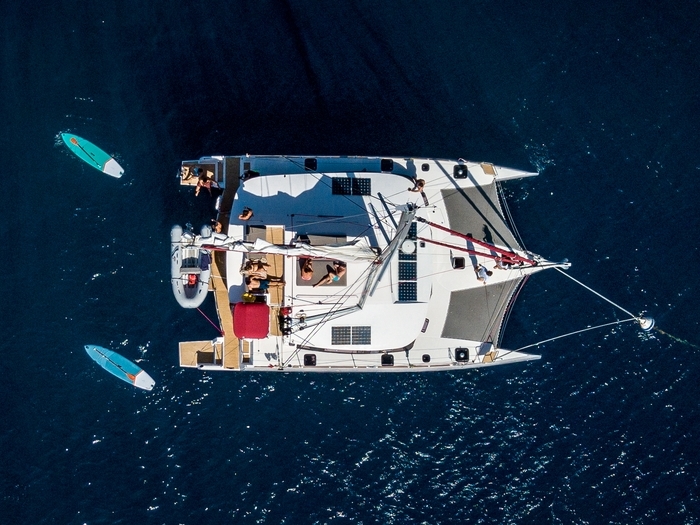
Before deciding to install solar panels on your yacht, several important factors must be considered to ensure the system is both practical and cost-effective. These include the yacht’s energy needs, the type of solar panels, the installation process, and the potential return on investment.
Yacht Size and Energy Needs
The first step in planning a solar installation is assessing the energy consumption of your yacht. Understanding how much power is required to run everything from lights to navigation systems, refrigerators, and other appliances will help determine the number of solar panels needed. A larger yacht or one with high power demands may require more panels or larger storage capacity to meet daily energy needs, particularly on extended trips where access to shore power is unavailable.
Panel Types and Installation Options
Not all solar panels are created equal, and choosing the right type for a yacht is crucial. Rigid panels are more durable and provide higher efficiency, but they require more space for installation. Flexible solar panels, on the other hand, are lightweight and can be installed on curved surfaces, making them ideal for yachts with limited space. However, flexible panels tend to be less efficient than their rigid counterparts. The mounting process is another consideration; depending on the design of your yacht, you may need customized mounts, which can add to the cost.
Cost of Installation and Maintenance
When planning to install solar panels on a yacht, one of the crucial factors to consider is the budget required for the installation. The cost of solar panels varies depending on the type, efficiency, and size of the system. Generally, here’s what you can expect:
- Initial Costs: A basic system for a small to medium yacht can cost between €1,000 to €3,000 for a smaller setup. This includes the panels, wiring, and charge controllers. For larger yachts or systems with higher power output, prices can rise significantly, reaching €5,000 to €10,000 or more, especially if you are opting for high-efficiency panels.
- Types of Panels: There are two main types of solar panels: rigid and flexible. Rigid panels are often less expensive and more efficient, making them a popular choice for larger yachts or those with sufficient space for mounting. Flexible panels, while slightly less efficient, are more adaptable for yachts with limited space or curved surfaces, but they tend to cost more per watt.
- Additional Costs: Installation costs should also be factored in. Professional installation services can add €500 to €1,000, depending on the complexity of the setup. If you’re opting for a fully automated system with tracking capabilities, the price could increase significantly
Read also: The Guide To Preparing Your Yacht For Charter
Alternatives to Solar Panels for Yacht Energy
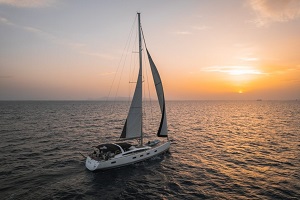
In addition to solar panels, there are several alternative energy sources for powering yachts. Diesel generators are the most common, offering reliable power, especially for high-demand systems. However, they can be noisy, polluting, and expensive to run. Another alternative is wind energy through the use of wind turbines, which provide a sustainable energy source, especially in windy areas. Wind turbines can supplement solar energy, but their output can be inconsistent depending on wind conditions. Additionally, hydrogenerators are an option for yachts cruising in open water, using the movement of the yacht through the water to generate electricity. These systems are efficient but can be expensive to install and maintain. For those looking to reduce reliance on fuel, combining multiple sources, such as wind and solar, can provide a more reliable and eco-friendly solution
Conclusion
In conclusion, installing solar panels on yachts offers a sustainable and efficient way to meet energy demands while enhancing autonomy at sea. They reduce reliance on traditional fuel sources, cut long-term costs, and contribute to a greener marine environment. However, their effectiveness is influenced by factors like initial costs, available space, weather conditions, and energy demands. Alternatives such as wind turbines, hydro generators, and diesel generators can complement or substitute solar energy depending on the yacht’s needs and cruising conditions. By carefully evaluating these options, yacht owners can create a tailored energy solution that balances efficiency, cost, and environmental impact, ensuring smoother and more sustainable sailing adventures.




